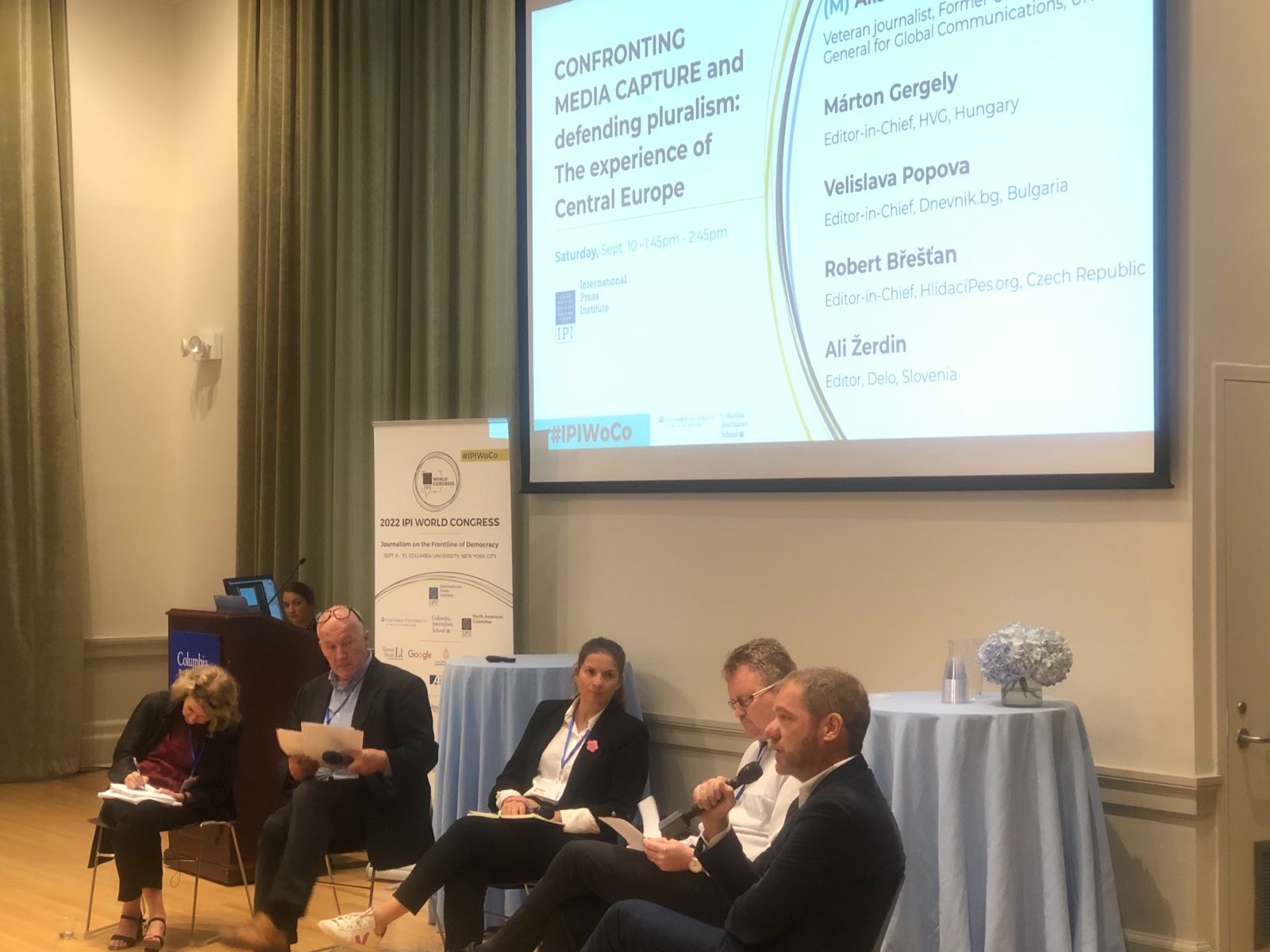Independent journalism and media pluralism in many countries within Central Europe are under sustained threat as a result of media capture, a panel of leading editors from across the region said at IPI’s World Congress 2022 in New York on September 10.
Speaking at the event at Columbia University, the editors from Hungary, Bulgaria, Slovenia and the Czech Republic shared experiences from their own countries about efforts by vested political and business interests to acquire once independent media.
Márton Gergely, editor-in-chief of Hungary’s largest current affairs weekly, HVG, told the crowd the model of media capture in Hungary was perhaps at the most advanced stage of any country in the European Union, arguing that the governing Fidesz party had worked patiently over the least 12 years to erode media pluralism and launch hostile takeovers of once independent press by oligarch owners connected to or supportive of the party.
The editor said that the construction of this pro-government media empire, cemented under the ownership of the KESMA conglomerate, was intended to keep the Fidesz voter in an “information vacuum”. He suggested that this distorted media ecosystem and the lack of access for citizens to independent sources of news had played a major role in the 2022 election victory of Prime Minister Orbán.
Looking at the wider region, Gergely argued that retreat of foreign media owners in Europe after the financial crisis in 2011 had paved the way for domestic business forces linked to political parties or governments in each country to move in and buy up much of the media markets, after which editorial lines were flipped and critical journalists purged.
⚡️Underway at #IPIWoCo: We examine how capture of media by political & business interests in Central Europe is a major threat to independent journalism.
Speakers: @alison_smale, @morrton, @brestan, Velislava Popova of @dnevnik & Ali Žerdin of @Delo
👉https://t.co/t0U6N9IyER pic.twitter.com/fTBO4mAQ7G
— IPI – The Global Network for Independent Media (@globalfreemedia) September 10, 2022
Discussing the situation in her own country, Velislava Popova, the editor-in-chief of leading daily newspaper Dnevnik, said: “Big media groups left Bulgaria, which gave space to new owners more connected with political and other interests in the country to step in. Another problem is that the state has also become the biggest advertiser in the media landscape. They misuse European funds, giving it to media who support the government.”
She added: “Year after year, the media environment in Bulgaria is slowly destroyed. Some quality media try to keep to our values and provide real journalism, but all the levers of the state can be used to put pressure on journalists and publishers. Independent journalism depends on independent financing.”
Robert Břešťan, editor-in-chief of HlídacíPes.org (WatchDog) in the Czech Republic explained that the spread of media capture there really began under Czech billionaire and former Prime Minister Andrej Babiš, whose sprawling Agrofert conglomerate purchased major publishing houses ahead of his entry into politics and now controls a third of the media market.
Babiš left government in November 2021 with a record of seeking to undermine the public broadcaster, steering government advertising to supportive media, and using his media power to promote and defend his government’s record, he explained.
Žerdin noted that under the previous government Slovenia had re-emerged as a country of concern in the EU regarding government interference in the media market and pressure on independent journalism. He also argued that plunging levels of trust in the traditional print and broadcast media across the region since the growth of social media platforms was also undermining the ability of hard-hitting watchdog media to have an impact.
The session was moderated by Alison Smale, a veteran journalist with The New York Times who closely covered the region for years. She said the media landscape now in Central Europe was very different to how many imagined when the former Easter bloc countries joined the European Union after the fall of communism.
Click here for more information about IPI’s World Congress 2022, which ran from September 8 until September 10.
